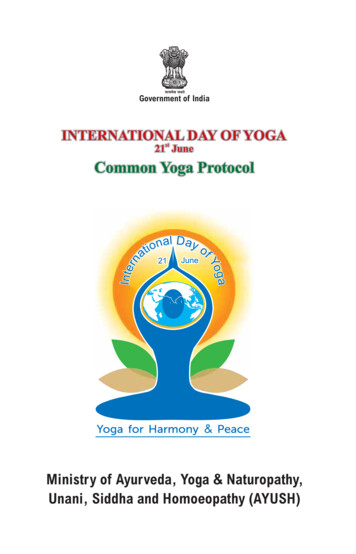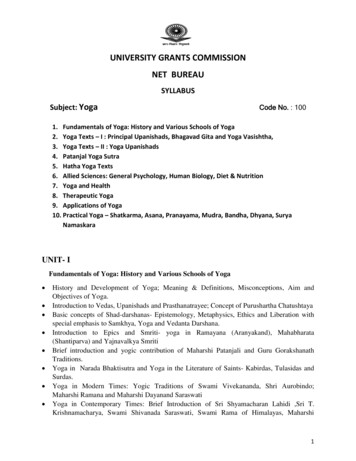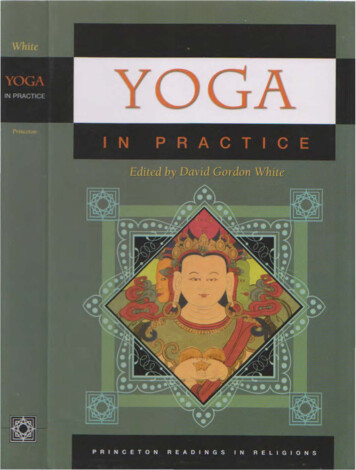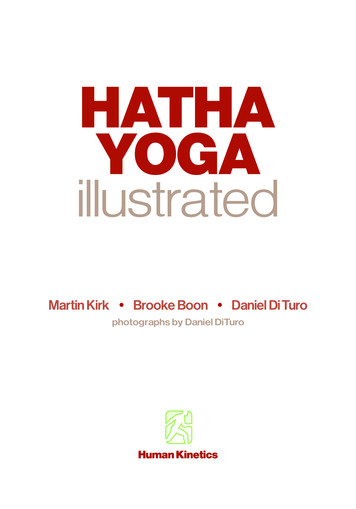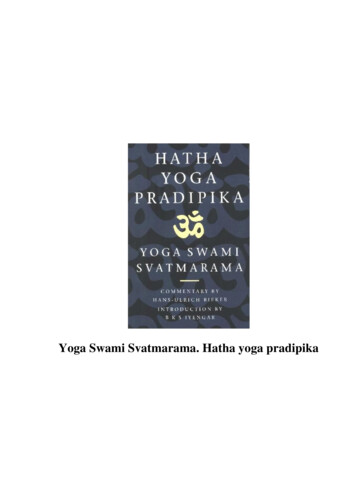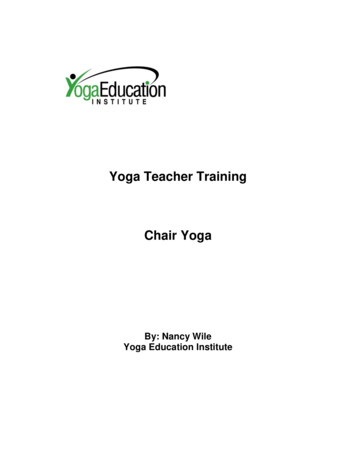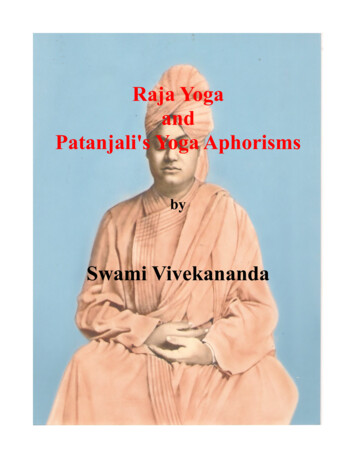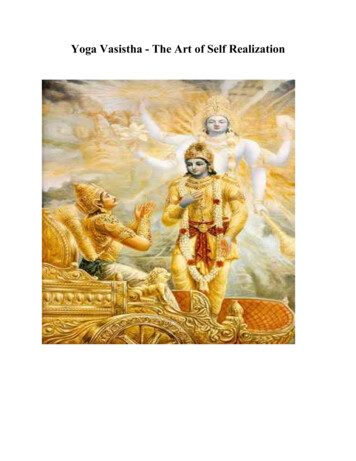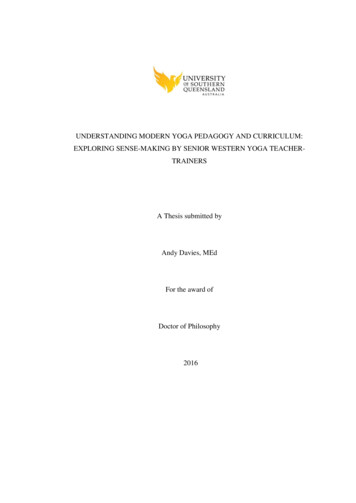
Transcription
UNDERSTANDING MODERN YOGA PEDAGOGY AND CURRICULUM:EXPLORING SENSE-MAKING BY SENIOR WESTERN YOGA TEACHERTRAINERSA Thesis submitted byAndy Davies, MEdFor the award ofDoctor of Philosophy2016
AbstractABSTRACTThis study explored senior Western Yoga teacher-trainers’ sense-making in thecontext of her or his Modern Yoga teacher-training programs. Through seniorWestern Yoga teacher-trainers’ sense-making of her or his interpretations andapplications of non-Western Yoga philosophies and traditions, meaning-making wasgenerated. Sense-making here denotes the participants’ understandings, whilemeaning-making refers to the understandings that I generated as the researcher. Theterm Modern Yoga is used in this study to represent a Western understanding andapplication of non-Western Yoga philosophies and traditions that are referred to hereas Premodern Yoga. The aim of this research was to construct a greaterunderstanding and appreciation of senior Western Yoga teacher-trainers’considerations when conceptualising, planning and implementing Yoga teachertraining. The research questions focused upon the senior Western Yoga teachertrainers’ spiritual-ethical reflections and her or his pedagogical and curriculumpriorities. This research contributes significantly to the body of scholarship related tothe pedagogical and curriculum world of Yoga teacher-training and Yoga teaching.In this trans-philosophical, transnational and transcultural research project, I havesought to disrupt various dichotomous understandings. These binaries wereconsidered under two broader umbrella binaries: East-West and Mind-Body. I drewupon the Sanskrit language to construct neologisms to provide me with a scaffoldwith which to disrupt the limitations and preferential treatment of either/or thinkingof Western and non-Western philosophies and meaning-making, while revealingcontextually rich, non-binaristic meaning-making. These neologisms represent anintended important contribution to theoretical and methodological knowledge. Theconceptualising and methodological application of these research neologisms affordresearchers an insight into re-appreciating traditional research nomenclature.In this study, face-to-face interviews were conducted in Australia and the UnitedStates of America with seven senior Western Yoga teacher-trainers during twodedicated excursions. With the intention of disrupting an East-West binary thinking,I constructed a contextually derived interpretation of narrative research that I havei
Abstractcalled the citta-kosha-narrative-restructuring model. This model draws upon theEastern Yogic construct of kosha and a Western academic way of knowing vianarrative research. The kosha model represents the integral, interconnected andinterpermeating understanding of the human body. Consequently, this citta-koshanarrative-re-structuring explored the interview transcripts through five lenses: body,energy, mind, intellectual discernment and spiritual consciousness. The citta-koshanarrative-re-structuring model represents a further contribution to theoretical andmethodological knowledge.Considering the axiological nature of Yoga and Yoga teaching, the study emphasisedethical considerations and decision-making. Specific compounded Sanskrit termswere used to construct more nuanced, contextually specific ethical deliberations forthis study. The emphasis on axiology and ethical considerations and decisionmaking, and the construction of neologisms to reflect this emphasis, represent acontribution to theoretical and methodological knowledge. The conceptualising andoperationalising of the six new terms for ethical deliberation demonstrate thepossibility of reconsidering ethical considerations in research.The findings from this research provide new theoretical insights into the spiritualethical considerations of Western Modern Yoga teacher-trainers, highlighting that,although cultural context and nomenclature have shifted from those of PremodernYoga teachers, the practice and instruction of Yoga still revolve aroundconsciousness development and the union of perceived disconnections. Thissignificant finding supports the argument that Modern Yoga, although it has beeninfluenced by transnational, transcultural, trans-philosophical and syncretic forces, isstill perceived and taught as a spiritual practice.Further, the study identified new theoretical and practice-based insights regarding theparticipants’ pedagogical and curricular priorities. The findings included thepedagogical importance of language considerations, oration and physicaldemonstration; the curriculum priorities of developing intention, facilitatingreflexivity and creating an embodied, self-discerning Yoga practice; and theimportance of incorporating other knowledge in Yoga teacher-training programs.ii
AbstractThese significant insights provide foundational understandings for future academicdiscourse in the field of Yoga pedagogy and curriculum design.In summary, this study has drawn upon Eastern philosophical and theoreticalknowledge to interpret senior Western teacher-trainers’ understanding andapplication of an Eastern Spiritual tradition. Through a trans-philosophical lens, keyinsights surrounding the pedagogical and curricular priorities of Modern Yogateacher-training have been established. The challenging of many previouslyunconsidered binary constructs has effectively rendered Modern Yoga’s pedagogicaland curriculum considerations and concerns more academically responsive andtheoretically informed. The construction and application of Sanskrit ethicalneologisms function as both an ethical barometer for researcher trustworthiness andan analytical data lens, demonstrating the benefit of this trans-philosophicaltheoretical and methodological approach. The utilisation of the Eastern Yoga koshamodel, transposed into an analytical narrative research model, highlights thetheoretical and methodological effectiveness of merging Eastern and Westernknowledge. The successful construction and application of the Sanskrit neologismsand the citta-kosha-narrative-restructuring framework reinforce the study’s efficacyand potential for innovation for future trans-philosophical research.KEY WORDS: PREMODERN YOGA, MODERN YOGA, YOGATEACHER-TRAINING, NEOLOGISMS, MIND-BODY, EAST-WEST,BINARIES, SENSE-MAKING, MEANING-MAKING, TRANSPHILOSOPHICAL RESEARCHiii
CertificationCERTIFICATION OF THESISThis thesis is entirely the work of Andy Davies except where otherwiseacknowledged. The work is original and has not previously been submitted for anyother award, except where acknowledged.Student and supervisors signatures of endorsement are held at USQ.iv
AcknowledgmentsACKNOWLEDGMENTSTo Pat and Bryan, the best parents a lad could ever hope for; I thank you for yourunfailing support and encouragement throughout my life.To Pat and Warren, my supervisors and friends, who were there, just as I needed youto be, with your sage advice and wisdom always.To Yvonne, Nettie and Sharon thank you for challenging me when I was a new Yogateacher and a new Yoga teacher-trainer. Your challenges and support help build theperson I am today.To Kirt, for being the best sister ever. Your critical mind and generous support wasalways appreciated and timely.To my Yoga, philosophy and meditation teachers, without whom my thesis wouldnever have been realised. I honour each of you.Renee and Jill, my PhD girlfriends, thank you for being there. It was always good toknow that no matter what we had each other’s back, even when we were wrong!To Cristy, my go to and touchstone at USQ who went above and beyond with yourunfailing sence of humour and wit. Always good for a debrief, you made my journeya much easier, not to mention a more enjoyable one.To Ysanne Chapman who provided me excellent support in preparing the thesis foradmission. She assisted me with: Table of Contents; Margins; Headers; and generalidentification and problem solving for the formatting of my thesis.v
Table of ContentsTABLE OF CONTENTSABSTRACT . iCERTIFICATION OF THESIS .ivACKNOWLEDGMENTS . vTABLE OF CONTENTS .viLIST OF TABLES. xiiLIST OF FIGURES . xivLIST OF RELATED PUBLICATIONS AND PRESENTATIONS . xvPEER-REVIEWED JOURNAL ARTICLES . xvPEER-REVIEWED CHAPTERS IN EDITED RESEARCH BOOKS . xvCO-AUTHORED RESEARCH BOOKS . xviCO-EDITED RESEARCH BOOKS. xviPRESENTATIONS . xviChapter 1: Introduction . 11.1Thesis Introduction . 11.2Chapter Introduction . 21.3Key Elements of the Study . 31.4Yoga, Premodern Yoga and Modern Yoga . 41.5Important Terms and Concepts . 51.6Research Approaches . 101.6.1 The Research Interest and Research Questions . 101.6.2 Rationale and Significance (Contributions to Knowledge) . 111.6.2.1 Theoretical Knowledge . 111.6.2.2 Methodological Knowledge. 111.6.2.3 Practice-Based Knowledge . 121.7My Yoga Journey and This Thesis . 131.8Thesis Outline . 151.9Chapter Summary . 17Chapter 2: Literature Review and Conceptual Framework . 192.1 Chapter Introduction . 192.2 Introduction to the Literature Review. 202.3 Contextualising Premodern Yoga and Modern Yoga . 212.4 Historical and Philosophical Yoga Description and Timeline. 242.4.1 The Human Predicament: Maya, Karma and Samskara . 242.4.2 The Oral Instruction of Yoga and Its Influence . 252.4.3 Philosophical Timeline of Yoga in India . 262.4.4 The Vedic Age . 272.4.5 The Upanishadic Age . 28vi
Table of Contents2.4.6 The Bhagavad Gita . 302.4.7 The Yoga Sutras of Patanjali (Raja Yoga) . 302.4.8 The Tantric Age . 342.4.9 Hatha Yoga . 362.4.10 Modern Yoga . 402.5 My Experiences as a Yoga Teacher. 442.6 Conceptual Framework and Diagram . 482.6.1Introduction . 482.6.2My Three Lenses . 492.6.3Argument for the Three Lenses . 512.7Chapter Summary . 51Chapter 3: Philosophy, Neologisms and Ethical Deliberations . 523.1 Chapter Introduction . 523.2 Philosophical Elements – Being, Knowing and Caring. 523.2.1 Being (Ontology) . 543.2.2 Knowing (Epistemology) . 553.2.3 Caring (Axiology). 573.3 Trans-Philosophical Reflections . 593.3.1 Ontology, Being and Advaita Vedanta-Atman-Brahman . 603.3.2 Epistemology, Knowing and Raja Yoga-Purusha and Prakriti. 613.3.3 Axiology, Caring and Raja Yoga-Yamas and Niyamas . 633.3.4 Trans-Philosophical Reflections Summary and Neologisms. 643.4 Neologisms – New Research Nomenclature . 653.5 Ethical Deliberations . 783.5.1 My Reflexive Journey - Contextualising Ethics . 783.5.2 My Study’s Trans-Philosophical Presuppositions . 793.5.3 Ethical Neologisms . 793.5.4 Yama –Vidya (Ethical Reflexivity) . 813.5.5 Further Reflexive Ruminations. 833.5.6 Yama-Vidya-Ahimsa (Non-Harming) . 843.5.6.1 Ahimsa and the Notion of Anonymity and Confidentiality . 843.5.6.2 The Researcher’s Role . 873.5.7 Yama-Vidya-Satya (Truthfulness). 873.5.7.1 The Researcher’s Role . 883.5.7.2 The Svarupa (Data/Evidence) Collection . 893.5.7.3 Trans-Philosophical Language Alignment . 893.5.8 Yama-Vidya-Asteya (Non-Stealing) . 90vii
Table of Contents3.5.8.1 Access . 903.5.9 Yama-Vidya-Brahmacharya (Impeccable Conduct) . 913.5.9.1 The Literature Reviews. 913.5.10 Yama-Vidya-Aparigraha (Non-Grasping) . 923.5.10.1 Access . 923.5.10.2 The Svarupa (Data/Evidence) Collection . 933.5.11 Yama-Vidya-Guna (Quality) . 933.5.11.1 Access . 943.5.11.2 Design Choices . 943.5.12 Yama –Vidya (Ethical Reflexivity) Reflection . 953.6 Chapter Summary . 96Chapter 4: Marga - Research Pathway . 974.1 Chapter Introduction . 974.2 Participants . 984.2.1 Participant Selection . 984.2.1.1 Further Reflexive Ruminations. 1004.2.2 Participant Contact . 1014.2.3 Participant Interview Logistics . 1024.2.3.1 Further Reflexive Ruminations. 1024.3 Overview of Svarupa (Data/Evidence) . 1034.3.1 Further Reflexive Ruminations. 1044.3.2 Contextual Information. 1044.3.3 Demographic Information . 1054.3.3.1 Further Reflexive Ruminations. 1064.3.4 Perceptual Information . 1064.3.4.1 Further Reflexive Ruminations. 1064.3.5 Theoretical Information . 1084.3.5.1 Further Reflexive Ruminations. 1114.4 Research Design . 1114.4.1 Literature Search/Review about the Research . 1124.4.1.1 Further Reflexive Ruminations. 1144.4.2 Ethics Committee . 1144.4.2.1 Further Reflexive Ruminations. 1154.4.3 Confirmation of Candidature Proposal Presentation and Response . 1154.4.4 Research/Interview Question Development . 1164.4.4.1 Further Reflexive Ruminations. 1204.4.5 The Pilot Study . 120viii
Table of Contents4.4.6 Svarupa-Abhyasa (Data Collection Methods) . 1214.4.7 Argument for Discontinuing Further Interviews . 1224.5 Chapter Summary . 123Chapter 5: Marga - Research Steps . 1245.1 Chapter Introduction . 1245.2 Svarupa-Abhyasa (Data Collection Methods) . 1245.2.1 Svarupa-Abhyasa (Autoethnographic Reflections) . 1285.2.1.1 Further Reflexive Ruminations. 1295.2.2 Svarupa-Abhyasa (Face-to-Face Interviews). 1305.2.3 The Svarupa-Abhyasa (Face-to-Face Interview) Procedure . 1305.3 Svarupa-Tapas (Data/Evidence Analysis) . 1345.3.1 The Research Questions . 1355.3.2 The Yama-Vidya (Ethical Reflexivity) Framework . 1365.3.3 Narrative Research . 1365.3.3.1 Narrative Research in the Literature . 1375.3.3.2 The Citta-Kosha-Narrative-Restructuring Model . 1405.3.3.2.1 Stage One - Interview Transcription. 1415.3.3.2.2 Stage Two – The Categorising of Important Elements. 1415.3.3.2.3 Stage Three – The Restructuring of these Elements . 1445.4 Structure and Lenses: The Citta-Kosha-Narrative-Restructuring Chapters. 1505.5 Chapter Summary . 153Chapter 6: Citta-Kosha-Narrative-Restructuring – Annamaya Kosha . 155Chapters 7: Citta-Kosha-Narrative-Restructuring - Pranamaya Kosha . 1817.1 Chapter Introduction . 181Chapter 8: Citta-Kosha-Narrative-Restructuring – Manomaya Kosha. 1978.1 Chapter Introduction . 1978.2 Manomaya Kosha Description . 1988.3 Manomaya Kosha - Research Question 1 . 1998.3.1 Donna’s Excerpt . 1998.3.1.1 Svarupa-tapas (Data/Evidence Analysis). 2008.3.1.2 Andy’s autoethnographic notes, 20 February 2016 . 2008.3.1.3 Yama-vidya-satya (Ethical Reflexivity-Truthfulness). 2018.3.1.4 Yama-vidya-ahimsa (Ethical Reflexivity-Non-Harming) . 2018.3.2 Donna’s Excerpt . 2028.3.2.1 Svarupa-tapas (Data/Evidence Analysis). 2028.3.2.2 Yama-vidya-aparigraha (Ethical Reflexivity-Non-Grasping) . 2038.3.2.3 Yama-vidya-brahmacharya (Ethical Reflexivity-Impeccable-Conduct). 203ix
Table of Contents8.3.3 Simon’s Excerpt . 2048.3.3.1 Svarupa-tapas (Data/Evidence Analysis). 2058.3.3.2 Yama-vidya-brahmacharya (Ethical Reflexivity-Impeccable-Conduct). 2058.3.3.3 Yama-vidya-aparigraha (Ethical Reflexivity-Non-Grasping) . 2068.3.3.4 Yama-vidya-guna (Ethical Reflexivity-Quality) . 2068.3.4 Donna’s Excerpt . 2078.3.4.1 Svarupa-tapas (Data/Evidence Analysis). 2078.3.4.2 Yama-vidya-brahmacharya (Ethical Reflexivity-Impeccable-Conduct). 2088.3.4.3 Yama-vidya-brahmacharya (Ethical Reflexivity-Impeccable-Conduct). 2088.4 Manomaya Kosha - Research Question 2 . 2098.4.1 Donna’s Excerpt . 2108.4.1.1 Svarupa-tapas (Data/Evidence Analysis). 2108.4.1.2 Yama-vidya-satya (Ethical Reflexivity-Truthfulness). 2108.4.1.3 Andy’s autoethnographic notes, 10 January 2016 . 2108.4.1.4 Yama-vidya-aparigraha (Ethical Reflexivity-Non-Grasping) . 2118.4.1.4 Andy’s autoethnographic notes, 3 March 2016 . 2118.4.1.5 Yama-vidya-guna (Ethical Reflexivity-Quality) . 2128.4.2 Eric’s Excerpt . 2128.4.2.1 Svarupa-tapas (Data/Evidence Analysis). 2138.4.2.2 Yama-vidya-satya (Ethical Reflexivity-Truthfulness). 2138.4.2.3 Yama-vidya-guna (Ethical Reflexivity-Quality) . 2138.4.3 Donna’s Excerpt . 2148.4.3.1 Svarupa-tapas (Data/Evidence Analysis). 2148.4.3.2 Yama-vidya-guna (Ethical Reflexivity-Quality) . 2158.4.4 Donna’s Excerpt . 2158.4.4.1 Svarupa-tapas (Data/Evidence Analysis). 2168.4.4.2 Yama-vidya-guna (Ethical Reflexivity-Quality) . 2168.5 Chapter Summary . 217Chapter 11: Concluding Chapter . 26511.1 Chapter Introduction . 26511.2 Research Summary . 26511.3 Findings Synthesis . 27011.3.1 Research Question 1 . 27011.3.2 Research Question 2 . 272x
Table of Contents11.4 Knowledge Contributions . 27611.4.1 Theoretical . 27611.4.2 Methodological . 27711.4.3 Practice-Based . 27811.4.4 Disrupting Binaries . 27911.5 Suggestions for Further Research . 28011.6 Suggestions for Policy Development. 28111.7 Vidya-Ahankara-Samskara (Researcher Reflexivity and Positionality). 283REFERENCES . 285APPENDICES . 295APPENDIX A: THESIS NEOLOGISMS, MEANINGS AND APPLICATIONS 296APPENDIX B: RESEARCH STUDY PRÉCIS EMAIL . 312APPENDIX C: ETHICS CONSENT FORM . 313APPENDIX D: PARTICIPANT INFORMATION SHEET . 315APPENDIX E: PARTICIPANTS’ STATEMENT OF CONSENT . 318APPENDIX F: RESEARCH QUESTIONS – INTERVIEW QUESTIONS . 320xi
List of TablesLIST OF TABLESNUMBERTABLE DESCRIPTIONPAGE2.1Philosophical Timeline of Yoga in India272.2The Eight Limbs of Raja Yoga322.3Hatha Yoga Practices and Techniques383.1Neologisms Heading Banner3.2Thesis Neologisms, Meanings and Applications3.3The Yamas, Yama-Vidya and Meanings903.4Yama-Vidya-Ahimsa (Ethical Reflexivity-Non-Harming)9169-84and Meaning3.5Yama-Vidya-Satya (Ethical Reflexivity-Truthfulness)95and Meaning3.6Yama-Vidya-Asteya (Ethical Reflexivity-Non-Stealing)97and Meaning3.7Yama-Vidya-Brahmacharya (Ethical Reflexivity-98Impeccable-Conduct) and Meaning3.8Yama-Vidya-Aparigraha (Ethical Reflexivity-Non-99Grasping) and Meaning3.9Yama-Vidya-Guna (Ethical Reflexivity-Quality) and101Meaning4.1Marga (Research Methods/Approaches)1054.2Exposure Criteria Table1084.3Overview of Svarupa (Data/Evidence)1174.4Research Questions/Interview Questions Matrix4.5Svarupa-Abhyasa and Meanings5.1Svarupa-Abhyasa Summary5.2Svarupa-Tapas and Meanings1415.3A Description of the Traditional Kosha Model’s Layers1525.4The Citta-Kosha-Narrative-Restructuring Model5.5Example Structure - 34154-156159Chapter – Annamaya Koshaxii
List of Tables6.1Cross-Reading the Yama-Vidya in the Citta-Kosha-165N
This study explored senior Western Yoga teacher-trainers' sense-making in the context of her or his Modern Yoga teacher-training programs. Through senior Western Yoga teacher-trainers' sense-making of her or his interpretations and applications of non-Western Yoga philosophies and traditions, meaning-making was generated.
